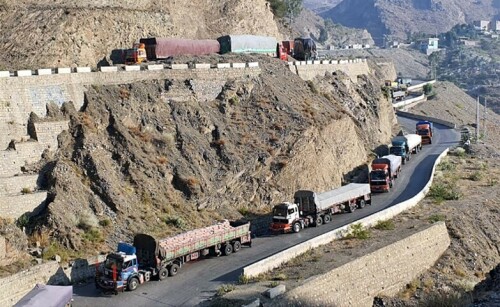PESHAWAR: A Peshawar High Court bench on Monday suspended a notification issued by the Khyber Pakhtunkhwa governor to create a four-member advisory board for the erstwhile Federally Administered Tribal Areas (Fata).
Justice Ikramullah Khan and Justice Mohammad Ibrahim Khan issued notices to the federal government and principal secretary to the governor seeking their response to a petition of citizen Jawed Iqbal against the issuance of that notification.
The bench directed the respondents to explain how the governor could order the creation of an advisory board after the passage of the Constitution (Twenty Fifth Amendment) Act, 2018, through which the erstwhile Fata were merged with Khyber Pakhtunkhwa.
It ruled that the notification would remain suspended until the holding of the next hearing.
Asks governor, govt to respond to plea against board notification
Mohammad Shoaib Razzak, lawyer for the petitioner, said the notification was issued on Feb 6, 2019, by the principal secretary to the governor.
He said the notification announced the formation of the advisory board comprising Umar Khan Afridi as chairman and Rustam Shah Mohmand, Mir Laiq Shah and Sangi Marjan as members.
The lawyer said the terms of reference had assigned wide-ranging powers to the board.
He added that the governor’s notification declared that the board would make recommendations to the government on issues arising out of the Fata-KP merger.
The lawyer said the board would propose a comprehensive mechanism for resolving civil and criminal disputes in accordance with local customs; make recommendations for the enforcement of decisions of the jury or jirga; create a law-enforcement force exclusively for the erstwhile Fata by organising short-term and long-term training for the existing Levies and Khasadar personnel, and ensure that the new system of governance does not delay decisions on court cases for a long time.
The lawyer said previously, the erstwhile Fata was governed through Article 247 of the Constitution with the governor issuing executive orders for the region.
He said following the enactment of the Constitution (Twenty Fifth Amendment) Act, Article 247 no longer existed and that the executive authority of Khyber Pakhtunkhwa had been extended to the merged tribal districts.
The lawyer said like other areas of the province, the executive authority in tribal districts vested in the provincial government, including the chief minister and cabinet, under Article 129 of the Constitution.
He insisted that the notification issued by the governor was illegal and unconstitutional.
Published in Dawn, March 26th, 2019














































Dear visitor, the comments section is undergoing an overhaul and will return soon.